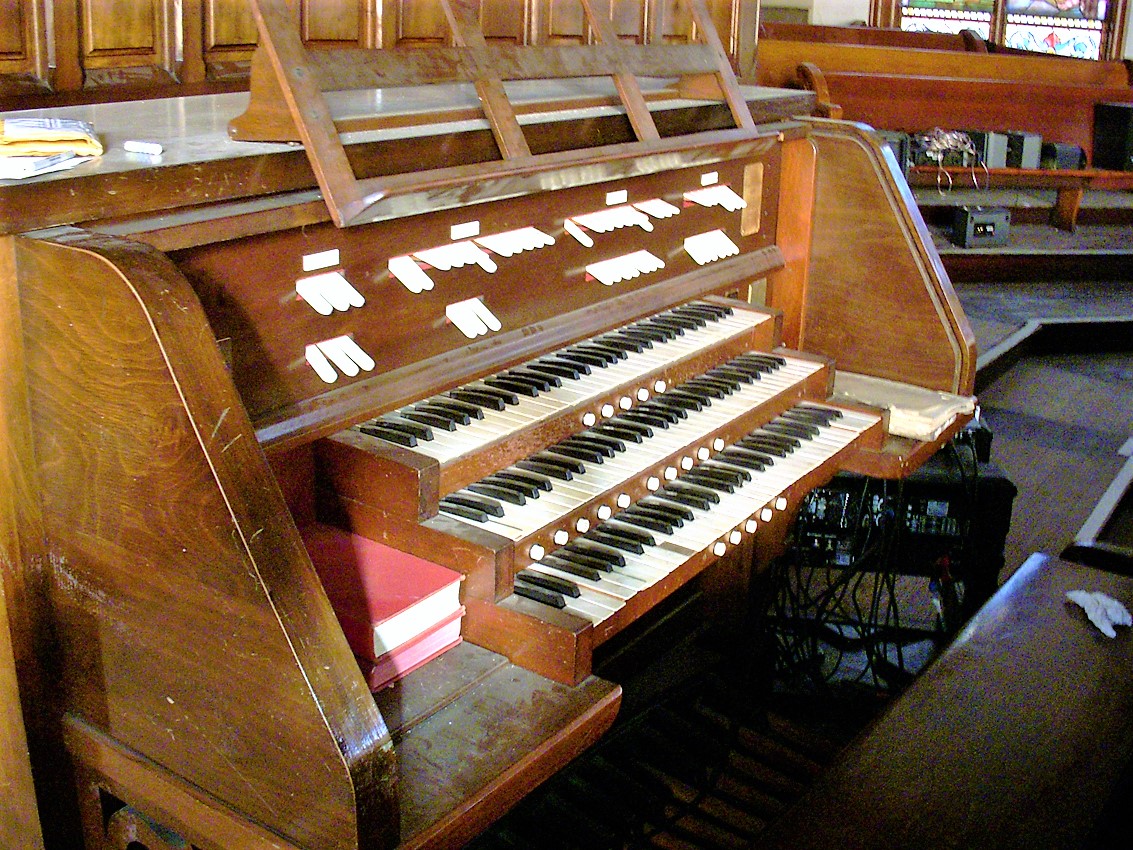
2012-04-12 - Console (Photograph by David Schmauch via the NYC AGO NYC Organ Project, submitted by Jeff Scofield/Jeff Scofield)

2012-04-19 - Identified through online information from Steven E. Lawson. -Database Manager
2020-11-24 - From the NYC AGO NYC Organ Project: Construction on the church and rectory began in the autumn of 1890, and the cornerstone was laid in April of 1891. The church is 60 feet wide by 102 feet deep and 67 feet high from the ground to the apex of the roof, and the tower is surmounted by a spire that rises to the height of 193 feet. In the upper portion of the tower is a Seth Thomas clock, below which is an unusually large Chime of 16 bells weighing a total of 24,000 pounds that was cast by the Henry Stuckstede Bell Foundry Co. of St. Louis, Mo. The three-story-and-basement rectory adjoins the church and is 20 feet wide by 58 feet deep. The church has five entrances, a gallery that extends around three sides, and seating for 1,200 people. When St. Mark's opened toward the end of the 19th century, Bushwick enjoyed tremendous prosperity due to its brewery industry. In 1890 there were 14 breweries operating in a 14-block area known as "Brewer's Row," and Bushwick became known as the "beer capital of the Northeast." Following World War II, Bushwick declined as breweries ceased operations and residents moved to other boroughs or out of the city altogether. By the 1970s, Bushwick had become a haven for drugs and gangs. During the 1977 Blackout, Bushwick saw some of the most devastating damages and losses due to arson, looting and rioting. At the beginning of the 21st century, crime had decreased significantly, but the vibrant community of a hundred years earlier had all but disappeared and St. Mark's congregation had dwindled to a handful of members. In June 2011, the church’s .6-acre lot was listed for sale for $5 million. The organ in the present church was originally built in 1892 by Carl Barckhoff of Salem, Ohio. As described in the Brooklyn Eagle (May 23, 1892), the organ had two manuals, a compass of 58 notes, and 1,589 pipes. To open the organ, a recital and concert under the direction of Alexander Riehm was given on Monday evening, June 6, with organist Henry E. Browne performing selections from Bach, Flotow, Rossini, Wagner and others. Also on the programme were the St. Mark's musical society orchestra, directed by W.C. Jagy, the St. Mark's male chorus, and a mixed quartet. In 1945, the Midmer-Losh Organ Company of Merrick, N.Y. electrified the organ and installed a new three-manual console that was prepared for a future Choir division. The stop-key console has 61-note manuals and a 32-note pedalboard, but it unknown if Midmer-Losh extended the manual and pedal ranks with additional pipes, or if the old Barckoff chests were replaced. The organ was unplayable in 2012. -Jeff Scofield
Source: Courtesy of the NYC AGO Organ Project
Brooklyn, New York
St. Mark Evangelical Lutheran Church
Barckhoff 1892 2/29
Midmer-Losh 1945 3/29
______________________________________________
GREAT SWELL
16' Open Diapason 58 16' Bourdon 58
8' Open Diapason 58 8' Open Diapason 58
8' Doppel Flute 58 8' Geigen Diapason 58
8' Gamba 58 8' Stopped Diapason 58
8' Dulciana 58 8' Salicional 58
4' Octave 58 4' Fugara 58
4' Flute Traverso 58 4' Flute Harmonic 58
2 2/3' Twelfth 58 2' Piccolo 58
2' Super Octave 58 III Cornet 174
III Mixture 174 8' Cornopean 58
8' Trumpet 58 8' Oboe 58
Super Tremulant
Sub
PEDAL Unison Off
Super
16' Open Diapason 27
16' Bourdon 27 CHOIR
8' Violoncello 27 7 prepared-for stops
[Received from Jeff Scofield November 24, 2020]Regrettably, it is not possible to display the information about the sponsor of this pipeorgandatabase entry or if there is a sponsor. Please see About Sponsors on Pipe Organ Database.